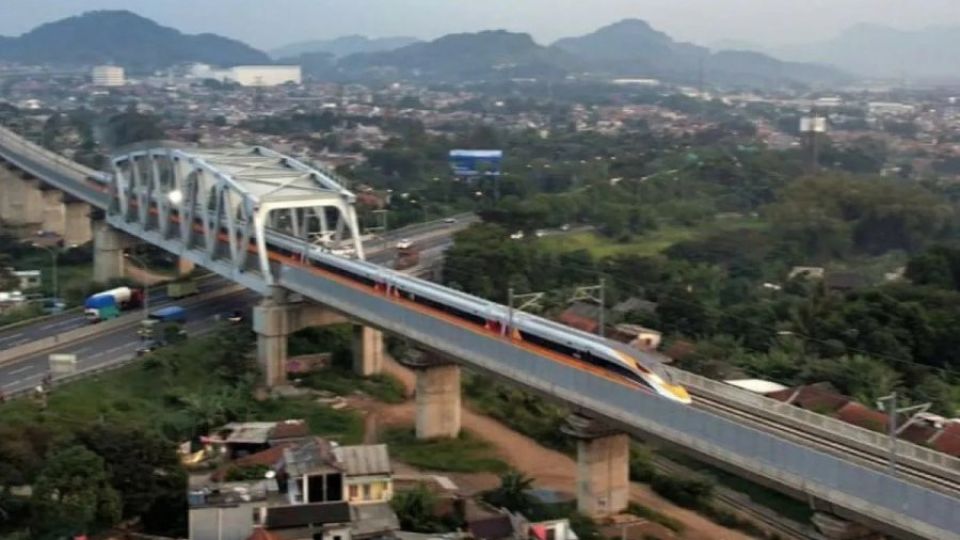September 20, 2023
JAKARTA – The government will permit the use of state funds as a loan guarantee to sustain the Jakarta-Bandung high-speed railway (HSR) project, a decision that has been criticized for putting a heavy burden on the taxpayer.
The guarantee would enable the HSR project to receive sufficient debt financing to conclude cost overruns incurred during its development, according to Article 2 of Finance Ministerial Regulation No. 89/2023, which took effect on Sept. 11.
The guarantee would come from the government, along with PT Penjaminan Infrastruktur Indonesia (PII), a state-owned infrastructure project guarantor.
The regulation stipulates the guarantee will cover all financial liabilities, including the loan principal, interest and other additional costs that may be incurred through state-owned railway company PT Kereta Api Indonesia (KAI).
KAI is the leader of the Indonesian side that owns a 60 percent share in PT Kereta Cepat Indonesia Cina (KCIC), the consortium responsible for the project.
Read also: HSR to fall far short of passenger target in early phase
Bhima Yudhistira, executive director of the Center of Economic and Law Studies (CELIOS), said on Tuesday that the financial agreement for the HSR project had deviated a lot from the government’s initial promise that it would be limited to business-to-business with no state involvement.
“[There is talk about] giving a state capital injection [PMN] and a proposal to subsidize ticket prices, now the government is also giving a loan guarantee,” Bhima told The Jakarta Post.
“This means the HSR project has become a financial burden that taxpayers have to bear, whereas it should be a commercially independent project,” he added.
The government has allowed the use of state funds in the form of a PMN and loan guarantees since 2021, after the project went grossly over-budget, while it was delayed from its initial target of launching in 2019.
KCIC has also submitted a request to extend the project concession period to 80 years from the previously agreed 50 years, following ballooning project costs and projected weaker demand.
Bhima opined that the Finance Ministry regulation needed to be reviewed and the House of Representatives needed to be consulted. The government must be transparent about the amount of state funding that would be used, he said. This includes interest payments to be paid and the state of KAI’s cash flow.
Abra Talattof, an analyst at the Institute for Development of Economics and Finance (INDEF) told the Post on Tuesday that he urged lawmakers not to stand idly by, but to hold the government accountable following a new policy that will put more of a burden on the state budget.
“This is an ambitious project that has received criticism since the beginning. Thus, the House could dig into the root cause and check who should be responsible through a special committee [Pansus],” Abra said.
Experts had previously warned that the policy could lead to a bad precedent as companies would become reliant on government funding to save over-budget state projects.
In April, Coordinating Minister for Maritime Affairs and Investment Luhut Pandjaitan said Indonesia and China had agreed that the cost overrun of the project would hover at US$1.2 billion.
From that amount, the project would need to get $560 in additional loans from China Development Bank (CDB) based on calculations of the portion that needed to be covered by debt and the rest to be funded by equity in KCIC.
To ease the government burden, Luhut has negotiated a cheaper interest rate with CDB to 2 percent from the previous 4 percent.
However, China maintains it could not go lower than 3.4 percent.
CDB insisted on getting a loan guarantee from the state, to cover a possible default, according to Luhut. However, at that time, the government could only offer a guarantee provided through state-owned guarantor PII.
Finance Minister Sri Mulyani assured reporters on Tuesday that KAI had sufficient financial capability to repay the loan, as it would get additional revenue from transporting coal in Sumatra. That is why the government is confident in providing such a guarantee.
She also said that the government would strengthen the capital structure of PII as co-guarantor of the project.
Read also: RI hands early years of high-speed rail operation to China Railway
Finance Ministry spokesman Deni Sujantoro told the Post on Tuesday that the government had adequate resources to guarantee the loan for the project.
He added that the guarantee would come with a ring-fenced protection scheme, which implies there would be a segregation between PII and the state budget so that the government itself will remain largely be insulated from the risk.
“The guarantee would only become a responsibility if there was a claim on the object that is being guaranteed,” Deni said to the Post on Tuesday.
Furthermore, when providing the guarantee, the regulation requires the government to consider the state budget’s capacity for risk management. Approval will also involve the State-Owned Enterprises (SOEs) Ministry and Transportation Ministry.


